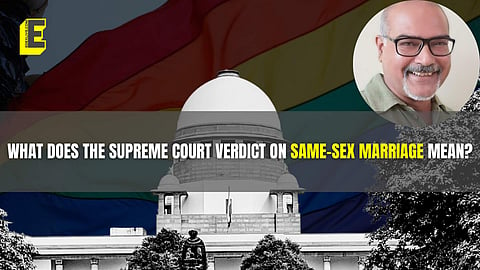

The Supreme Court, on Tuesday, October 17, delivered its verdict on the legal recognition of same-sex marriage, pronouncing that it is within Parliament's ambit to change the law for validating such unions.
While the landmark judgement did not bring any immediate changes in the Special Marriage Act, as the petitioners had demanded, the hearing involved discussion on a vast array of topics like adoption rights for the queer community, legal recognition of non-heterosexual unions, discrimination towards the queer community, marriage rights for trans heterosexual couples, and so on.
However, as the majority verdict by the five-judge bench refused to give immediate recognition to same-sex marriage, leaving it to the Parliament, several questions remained, including what does the verdict entail for the queer community and is there still any hope for same-sex couples in India?
Niladri R Chatterjee, Professor, Sexuality and Gender Studies, Department of English, University of Kalyani, West Bengal, addressed a few such questions in a conversation with EdexLive. Here is an excerpt from our conversation:
What do you make of the verdict?
I did not have very high hopes because I knew that it would be quite tricky, legally, to declare same sex marriage as legal for the Supreme Court. I genuinely believe that if it has to happen, it would have to be through the parliament.
What I was hoping that the Supreme Court would do instead was to give same-sex couples some rights. For example, they could have allowed same sex couples to open a joint account, or they could have been allowed to list their significant other as a nominee, or other such benefits could be given.
However, the verdict seems to be exactly what I was dreading it to be, that it is all up to the Parliament now. We know that this present government is not interested in doing anything about marriage equality. So, the whole question has been heaped, indefinitely, into the future and we do not know how long it would take.
What does the verdict mean for youngsters and students? Is there any win at all?
I am so sorry to say but there isn’t. The overall verdict does not hold any promise at all because the ball has been kicked into the government’s field. I do not see any silver lining.
I think the verdict states the obvious saying that a trans woman can marry a trans man or a cis man. These things were already in place, there is nothing new as far as I could gather.
Now that the decision has been passed on to the legislature, do you think there is any chance that things might start looking up for queer people in India?
Of course, nothing is ever impossible but the chances are very slim. As we all know the current dispensation is not particularly fond of the LGBTQIA+ community. Therefore, I think that things are looking pretty bleak as of now for the foreseeable future. I am hoping that there will be a change of heart in the distant future, maybe 10-20 years. But there is no immediate hope as far as I can see.
What does the verdict entail for adoption rights for the queer couples in India?
I think the verdict is quite clear. It is a 3:2 verdict by the Supreme Court. So while two judges, including Chief Justice DY Chandrachud, said that adoption rights could perhaps be made available to same sex couples, the other three judges disagreed. So there is no hope for adoption at the moment.
How does it affect live-in relationships for same-sex couples?
They can always live together. This is nothing new ever since the 2018 verdict, or even before that, two men or two women could always live together.
However, there is no legal framework to ensure that same sex couples are not harassed. These are all recommendations and directions that the Supreme Court gives. But as we have seen on multiple occasions in the past, even during the 2018 verdict, the Supreme Court had given lots of important suggestions including one that said that central and state governments should actively promote understanding regarding same sex couples. But did any of the governments do anything about it?
So, though two men or two women can live together, there is no legal protection for these couples. For heterosexual couples, even if they are unmarried, they have some kind of legal protection which has not been made available for queer people. So, you can live together but the law will do nothing to protect you
